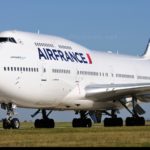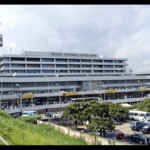
Globally the air transport industry remains the most affected by the COVID-19 pandemic which is currently ravaging the world. In Nigeria, it has paralysed domestic airline operations. So there is need for urgent financial intervention local airlines may collapse
Air transport is described as the catalyst for any nation’s economy. This is because it is the fastest means of transport used by the drivers of any nation’s economy.
When the world woke up to the tragedy of the coronavirus (COVID-19) in January and Wuhan Province in China where the disease started was put on lock down, the first global effect of the disease was the shrinking of flight operations.
As the virus spread, consuming human lives in its wake, air transport continued to shrink until the world’s airspace is almost on lock down.
As at Tuesday, the International Air Transport Association (IATA) put airlines losses to the pandemic to about $252 billion and warned the industry would lose more money and many of the airlines would go under.
In fact, it is said that COVID-19 will resent the world. IATA said that after the virus devastation, the airline industry recovery would be hampered by economic depression, which the International Monitory Fund (IMF) said would be as bad as that of 2008.
Stimulus for Airlines
Countries have laid out stimulus plans for their airlines and some have already started supporting their carriers to surmount the financial crash occasioned by the Coronavirus.
IATA recently commended nations that have announced stimulus plans for the airlines. Australia has announced an A$715 million ($430 million) aid package comprising refunds and forward waivers on fuel taxes, and domestic air navigation and regional aviation security charges. Brazil is allowing airlines to postpone payments of air navigation and airport fees.
China has introduced a number of measures, including reductions in landing, parking and air navigation charges as well as subsidies for airlines that continued to mount flights to the country.
Also, Hong Kong Airport Authority (HKAA), with government support, is providing a total relief package valued at HK$1.6 billion ($206 million) for the airport community including waivers on airport and air navigation fees and charges, and certain licensing fees, rent reductions for aviation services providers and other measures.
In a similar vein, New Zealand’s government will open a NZ$900 million ($580 million) loan facility to the national carrier as well as an additional NZ$600 million relief package for the aviation sector.
Also, Norway’s government is providing a conditional state loan-guarantee for its aviation industry totaling NKr6 billion ($533 million).
Qatar’s Minister of Finance has issued a statement of support for the national carrier. Singapore has undertaken relief measures valued at S$112 million (US$82 million) including rebates on airport charges, assistance to ground handling agents, and rental rebates at Changi Airport.
Domestic Airlines
In Nigeria, since the past three weeks flight operations have been hampered by low load factor, which forced airlines to crash fares below the cost of operation. By Monday some airlines had started considering suspension of operations and Aero Contractors was the first to announce the suspension of flight operation before the total lock down by the Lagos state government.
Air Peace, which has over 50 per cent of the market share in domestic airline operation will suspend operation midnight today for the total lockdown because the management believed that it would be a major way to support government to stem the community spread of the disease by discouraging people coming together at the airport.
It has to be noted also that Air Peace two weeks ago introduced a COVID-19 team, which administers and checks the temperature of every passenger before he is allowed to board every of the airline’s flight. The measure paid off as the process exposed suspected Coronavirus case.
Operational Losses
In Nigeria, domestic airlines have lost over 80 per cent of their market and are forced to bring down air fares to the “level that cannot even cover cost of fuel just to attract passengers to travel.”
The Chief Operating Officer (COO) of Air Peace, Mrs. Toyin Olajide disclosed to THISDAY in Lagos that the airline has lost about N2.1 billion in the last three weeks and has continued to lose money as load factor has gone below 40 per cent.
“We have been losing a lot. We lose money daily because passenger figures have dropped by over 60 per cent. We lose N100 million daily and we have been doing that in the last three weeks. People are no longer flying. We now attract passengers by lowering the fares since the past three weeks.
“We charge N23, 000 ticket for over 100 passengers in one flight. That is below the cost of fuel for a flight. We have to count the cost of insurance, spares and getting spares is very difficult now as there are no more international flights. So if you don’t have aircraft spares in your store, it becomes very difficult to replace the one in the aircraft because there are no flights.
“Under the period of this pandemic, airlines are the worst hit. So we call on the federal government to see how they can help airlines, as other countries are doing; otherwise jobs will be lost. This is a global problem.
“No airline can even pay salary this month. For the airlines to be afloat we need government support. Government can start by giving domestic airlines waivers on charges and taxes; unless they want the airlines to die,”Olajide said.
Air Peace alone employed about 3,500 work force and it is projected that without intervention from government, the domestic airlines would be crippled financially and over 20, 000 of direct and indirect employees would lose their jobs.
The Chairman of Airline Operators of Nigeria (AON), Captain Nogie Meggison, told THISDAY in an interview in Lagos that load factor in domestic operation has drastically gone down and it would get worse with the shut down of economic activities by the Lagos state government in the bid to check the spread of pandemic.
“The load factor is out. How long can we survive this way? Load factor is below 40 per cent so airlines are not even getting the cost of operation so the best thing is to stop. The problem is that interest rates continue to grow. Banks will not recognise the economic downturn caused by COVID-19.
“The value of the aircraft is going to be down and even when you ground your aircraft when the calendar dates come for mandatory checks, you must conduct the checks. If this shut down continues to summer the market will be distorted.
“The whole problem is in a spin right now. We are still going to do retraining of pilots overseas but no country will open its borders for you. Insurance will continue to run but the airlines can only change premium from airborne insurance to ground insurance after 30 days, which will save them 20 per cent of the premium. The whole thing is a spin,” Meggison said.

CBN/FG Financial Support
Last week the Central Bank of Nigeria (CBN) said it would increase its intervention in local manufacturing and import substitution by N1 trillion. That was the second CBN stimulus package as part of the bank’s response to the Coronavirus pandemic in Nigeria.
Apart from the N1 trillion intervention, the CBN in addition to the N50 billion soft loan to small businesses and had increased its intervention by another N100 billion in loan to support health authorities to ensure laboratories, researchers, and innovators work with global scientists to patent or produce vaccines and test kits in Nigeria to prepare for any major crises ahead.
The airlines have urged the federal government to extend the CBN financial intervention to them, knowing the critical role the operators play in sustaining the economy and the fact that it is the sector that is most impacted by COVID-19.
Bailout
The Chief Executive Officer of Aero Contractors, Captain Ado Sanusi said before the coronavirus epidemic, many Nigerian airlines were in weak financial state and the situation was exacerbated by the pandemic, which has literally drained the last breath from the domestic carriers. He said the airlines need life support to survive. He said airlines need bailout.
Sanusi also said a sincere bailout plan means that government or the CBN would have to know the impact of the financial loss, the particular area the airlines lost money and how much they would need in order to survive and sustain their operation; there would be need for airlines to point out areas they have the impact of the losses.
“You know many Nigerian airlines have been struggling before COVID-19 degenerated their finances. Government must engage in smart bailout to help the airlines and this will go directly to the airlines.
“So before the bailout is given, the airline will explain when the impact of COVID-19 was most felt. If it is in the area of salary; that the airline cannot pay salary again, government will look at the amount owed and pay and ensure the money was used for salary. If is to servicing leased aircraft or for maintenance, government will ensure that the money will be used for that purpose when disbursed,” Sanusi said.
He said the amount given should be seen as a grant or loan that must be repaid, but long term, single digit loan. So the grant will be seen as an investment or it will be used to retain staff, instead of allowing workers to lose their jobs.
Industry stakeholders and consultant, Amos Akpan, predicted that there would be a lock down after which the losses by airlines would be assessed, noting that it would be difficult for the airlines to survive without bailout, adding that it is a global problem and every country is rallying round to support their own airlines.
“We have to lock down first. You cannot assess damage before lock down. It is after lock down that we would know what the situation is. Air Peace, Aero Contractors, Arik Air and Dana Air are grounding operations. Airlines are going to go down. It is a total industry problem but government must have to intervene. However, it is too early to assess the damage now,” Akpan said
THISDAY






